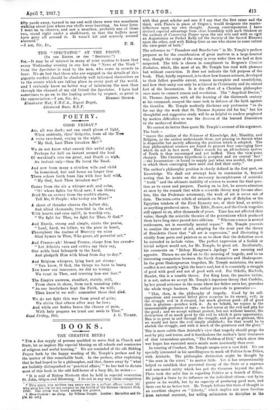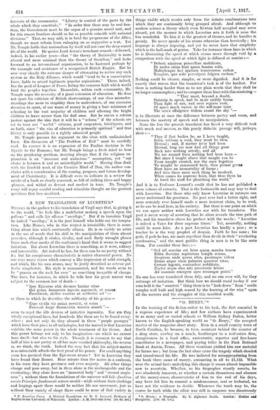BOOKS.
THE CREATIVE MIND.?
" Fon a due supply of persons qualified to serve God in Church and State, let us implore His especial blessing on all schools and seminaries of religious and useful learning." We are reminded of the old Bidding Prayer both by the happy wording of Mr. Temple's preface and by the matter of this remarkable book. In the preface, after explaining that he had hoped to be a philosopher, and that, drawn away by " what are foolishly distinguished as ' practical affairs,' " he has had to dictate most of this book in the odd half-hours of a busy life, he writes :-
" It is said of Bishop Westcott that he held in especial veneration St. John, Origen and Browning. I do not in any way claim comparison
• This poem was written' two yen's *To by a gallant officer (aetat. 18) who gave his life for his country at the battle of the Somme (August 31st, 1916). The poem was found among his papers.
t Yens Crcatriz : an Essay. By William Temple. London : Macmillan and Co. [7s, Od. net]
with that great scholar and seer if I say that the first name and the third, with Plato's in place of Origen's, would designate the master-
influences upon my own thought. Among contemporaries I have derived especial advantage from close friendship with such thinkers as the authors of Concerning Prayer upon the one side and with so rigid
an Augustinian as Father Kelly (of the Society'of the Sacred Mission) upon the other, and with Bishop Gore as one who shares to some extent tho view-point of both."
The reference to " Founders and Benefactors " in Mr. Temple's preface prepares us for the consideration of great matters in a large-hearted way, though the scope of the essay is even wider than we had at first suspected. The title is chosen in compliment to Bergson's Creat;re Evolution, which, like most of us, Mr. Temple has read with pleasure but without conviction. It does not indicate the full purpose of the book. That, briefly expressed, is to show how human sciences, developed to their fullest possible extent, remain incomplete and unsatisfying, and how their unity can only be achieved in Christianity and its central fact of the Incarnation. It is the (fort of a Christian philosopher once more to connect reason and revelation. The " Angelical Doctor," St. Thomas Aquinas, with all the learning of the thirteenth century at his command, essayed the same task in defence of the faith against the Gentiles. Mr. Temple modestly disclaims any pretension " to do for our day the work that Si. Thomas Aquinas did for his," but his thoughtful and suggestive study will be as helpful to readers perplexed by modem difficulties as was the Sumnza of the learned Dominican to the mediaeval doubter.
We cannot do better than quote Mr. Temple's account of his argument. The book- " traces the outline of the Sciences of Knowledge, Art, Morality, and Religion, as the author understands them, not pausing to discuss what is disputable but merely affirming the position which is adopted. The four philosophical sciences are found to present four converging lines which do not in fact meet. Man's search for an all-inclusive system of Truth is thus encouraged and yet baffled. Then the view-point changes. The Christian hypothesis is accepted and its central ` fact ' —the Incarnation—is found to supply just what was needed, the point in which these converging lines meet and find their unity."
The author's philosophic position is clearly defined in the first part, on Knowledge. We shall not attempt here to summarize it, beyond noting that he insists on the necessary incompleteness of scientific " truth " and the ultimate inability of science to answer the final quee. tion as to cause and purpose. Passing on to Art, he arrests attention at once by the remark that while a scientific theory may become obso- lete, like the Ptolemaic astronomy, the work of art is never out of date. The terra-cotta reliefs of animals on the gate of Babylon or the Egyptian trinkets of the First Dynasty are, of their kind, as artistic as anything produced since. The Bible, Homer, and the Greek tragedies still appeal to us, after thousands of years. Time has not affected their value, though the scientific theories of the generations which produced them have long since passed into oblivion. " 'Whereas science is mental restlessness, art is essentially mental repose." Mr. Temple proceeds to analyse the nature of art, adopting for the most part the theory of Benedetto Croce that " all art is expression," and illustrating it vividly from poets and painters so as to show that the definition must be extended to include value. The perfect expression of a foolish or trivial subject would not, for Mr. Temple, be great art. Incidentally, his comments on " Bishop Blougram's Apology " are amusing and apposite. Thence we are led on to tho meaning of tragedy, and to an interesting comparison between the Greek dramatists and Shakespeare. In the great Shakespearean tragedies, Mr. Temple maintains, the main conflict is not merely NI-41in the hero's soul, but it is essentially a struggle of good with good and not of good with evil. For Othello, Macbeth, Hamlet, this is a tenable theory. For King Lear, the passive victim, it is not, unless we accept Mr. Temple's ingenious theory that Cordeia, by. her proud reticence in the scene where her father rates her, provokes the whole tragic business. The author proceeds to generalize :—
" This, _then, is the philosophy of tragedy. Good by its self- opposition and essential defect gives occasion to its enemy, evil; in the struggle evil is d stroyed, but much glorious good—all of good that is glorious—perishes with it. As we behold, we rejoice in the immeasurable greatness of man ; we feel terror at the evil and pity for the good ; and we accept without protest, but not without lament, the destruction of so much good by the evil to which it gave opportunity. Man is so great in and through the struggle, and good so glorious, that we would not have the evil simply abolished ; for that would be to abolish the struggle, and with it much of the greatness and the glory." This is more subtle than Aristotle's view that tragedy should purge the soul by pity and terror, and it foreshadows the author's later treatment of that tremendous question, " The Problem of Evil," which since this war began has exercised men's minds more insistently than ever.
In treating of Conduct, Mr. Temple ranges over a vast field. We are specially interested in his unwillingness to mark off Politics from Ethics, with Aristotle. The philosophic distinction might be thought by " the man in the street " to matter little. Yet it has unquestionably helped to establish that perverted theory of the State as a supreme and non-moral entity which has put the Germans beyond the pale. Plato took the safer line in regarding Polities as a branch of Ethic.. He judged a State by its influence on the individual citizen—not by its power or its wealth, but by its capacity of producing good men, and there can be no better test. Mr. Temple follows this train of thought in an excellent chapter on " Liberty," which implies not mere freedom from external restraint, but willing submission to discipline in the
interests of the community. " Liberty is control of the parts by the whole which they constitute." " In order that there may be real free- dom, the Government must be the organ of a genuine moral unit, and for this reason frontiers should so far as possible coincide with national divisions." That, we may add, is in brief the programme of the Allies, though we must refrain from enlarging on so suggestive a text. Yet Mr. Temple holds that nationalism by itself will not cure the deep-seated ills of the world. He quotes Lord Acton's trenchant remark—delivered, indeed, in his earlier years—that " the theory of Nationality is more absurd and more criminal than the theory of Socialism," and looks forward to an international organization, to be hastened perhaps by the example and assistance of a reorganized British Empire. But ho sees very clearly the extreme danger of attempting to revive any such system as the Holy Alliance, which would "tend to be a conservative force, liable to retard legitimate popular aspirations." There, indeed, lies the peril of Leagues of Peace, failing the common faith which would bind the peoples together. Meanwhile, within each community, Mr. Temple urges the necessity of a great extension of education. He does not spare his criticism of British shortcomings, of our class misunder- standings duo more to stupidity than to malevolence, of our excessive devotion to sport, of our waste of money in giving a bare minimum of schooling to the vast majority of children and allowing the bright children to leave sooner than the dull ones. But he enters a solemn protest against the idea that it will be a " reform " if the schools are set to turn out " useful " citizens, good carpenters, bricklayers, and so forth, since " the aim of education is primarily spiritual " and true liberty is only possible to a rightly educated people.
Mr. Temple pursues his argument to the close with undiminished force. His discussion of " The Problem of Evil" must be carefully read. In essence it is an expansion of the Pauline doctrine in the Epistle to the Romans; but Mr. Temple brings a fresh mind to bear on the perplexing problem, insisting always that if the religious ex- planation is an " immense and audacious " assumption, yet " our choice is between it and an unintelligible world." Having thus dealt with the fourfold work of the Creative Mind of Man, the author con- cludes with a consideration of the coming, progress, and future develop- ment of Christianity. It is difficult even to indicate in a review the merits of a book so closely reasoned, so full of striking ideas and happy phrases, and withal so devout and modest in tone. Mr. Temple's essay will repay careful reading and stimulate thought on the greatest questions that face mankind.



























 Previous page
Previous page